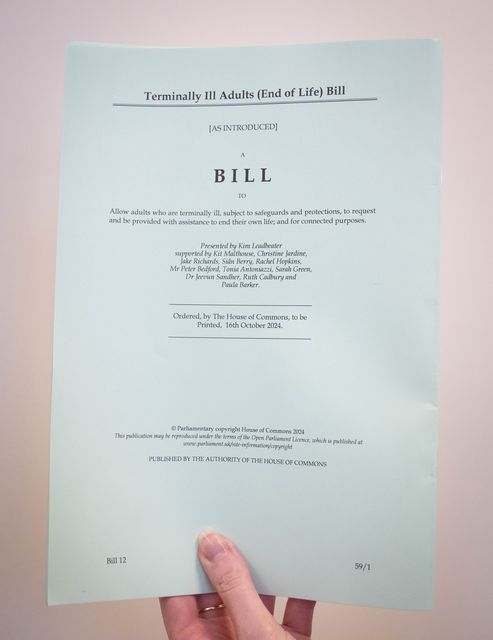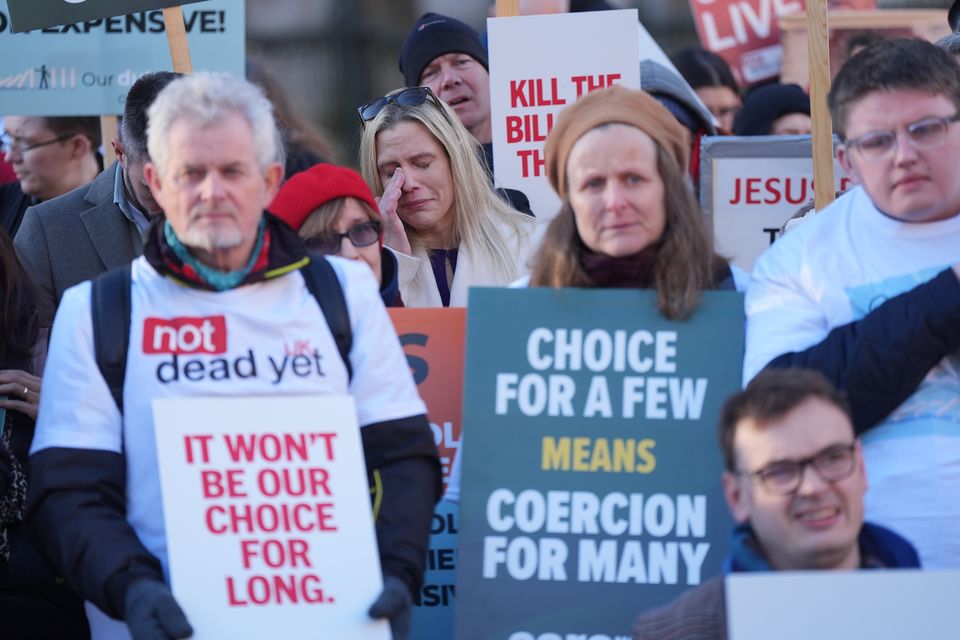The MP behind the assisted dying Bill has proposed replacing the need for High Court judge approval with an expert panel in a move she argues would strengthen a new law.
Kim Leadbeater, the Labour MP behind the Terminally Ill Adults (End of Life) Bill, is expected to bring forward amendments for a so-called “judge plus” system, after hearing concerns during expert evidence sessions last month.
MPs opposed to the Bill said the new proposals weaken safeguards, not strengthen them.
Psychiatrists and social workers would be involved in approving assisted dying applications under the proposals.
A group of 23 MPs is preparing to undertake line-by-line scrutiny of the proposed legislation from Tuesday, with the process expected to last weeks.
As it stands, the Bill could see terminally ill adults in England and Wales with under six months to live legally allowed to end their lives, subject to approval by two doctors and a High Court judge.
Ms Leadbeater had said the High Court approval element made her legislation the strictest in the world.
She has now proposed a judge-led Voluntary Assisted Dying Commission that she said would give a greater role to experts, including psychiatrists and social workers, in overseeing applications.
The commission would be led by a High Court judge or a senior former judge and receive all applications and reports from two independent doctors, which would then be referred to a three-member panel chaired by what has been described as a senior legal figure.
Ms Leadbeater said the panel would be “wholly independent” and would need to be satisfied the decision by the dying person was “voluntary and not the result of pressure or coercion, and that the person had the capacity to make that decision”.
The Assisted Dying Bill (Stefan Rousseau/PA)
Fears around people feeling coerced into an assisted death have been raised before, during and since the debate around a new law.
Among the expert evidence to the committee in January, learning disability charity Mencap warned of the “extremely risky and dangerous moment” an initial conversation about the option of assisted dying could be.
Dan Scorer, head of policy and public affairs at the charity, said there are concerns it could be “highly suggestive and push people in a course that they don’t, they may not want to go down” and that Mencap believes initial conversations would have to be “incredibly well supported and structured” with an advocate present.
Ms Leadbeater has already shared her proposal that doctors would be required to set out a range of other options available to a patient if they discuss assisted dying.
On the latest proposed changes, she said: “Many of those who gave evidence to the committee, either in person or in writing, recommended an enhanced role for professionals such as psychiatrists and social workers.
“I agree that their expertise in assessing that a person is able to make a voluntary decision free from coercion or pressure, in addition to the necessary legal checks, will make the system even more robust.”
Ms Leadbeater said she was also conscious of England’s chief medical officer, Professor Sir Chris Whitty’s evidence about keeping safeguards as simple as possible.
He told MPs what is not wanted is for a person with a life expectancy of six months to be “stuck in a bureaucratic thicket”.
He added: “We do need to keep this simple. And my view is the best safeguards are simple safeguards. ”
Ms Leadbeater said: “I’m confident we can have a law which is workable in practice and enables people to decide for themselves what they want as their life draws to a close whilst also providing robust safeguards.
“We have a duty to give the small minority of terminally ill adults who may choose an assisted death the autonomy, dignity and choice they want.”
People take part in a demonstration at Old Palace Yard in Westminster, London, to oppose the Terminally Ill Adults (End of Life) Bill. A proposed law to legalise assisted dying in England (Yui Mok/PA)
Ms Leadbeater said the two independent doctors would be required to submit reports to the panel on each person applying to the commission for permission to die.
The panel would then decide whether they needed to make further inquiries, including hearing from the dying person, the doctors or anyone else.
Ms Leadbeater said the commission would report each year on the number and nature of all applications referred to it and whether they were approved or rejected.
Humanists UK chief executive Andrew Copson said: “This is good news. The High Court proposal was unworkable in the demands it placed on the state and provided no meaningful additional safety.
“This new proposal will routinely bring in relevant expertise while solving those workability problems.”
A number of MPs posted on social media criticising the new proposals.
Labour MP Diane Abbott posted on X saying: “Safeguards on the Assisted Dying Bill are collapsing. Rushed, badly thought out legislation. Needs to be voted down.”
Conservative shadow work and pensions minister Danny Kruger posted on X saying: “Approval by the High Court – the key safeguard used to sell the Assisted Suicide Bill to MPs – has been dropped.
“Instead, we have a panel, NOT including a judge, of people committed to the process, sitting in private, without hearing arguments from the other side. A disgrace”
Liberal Democrat MP Tim Farron posted on X: “Lots of MPs voted for the bill at 2nd reading in the expectation that there would be stronger safeguards added at committee stage… and yet we now see that even the weak safeguards that existed, are being dropped.”
No date has been given yet for the Bill to return to the Commons for further debate by all MPs at report stage, but it is likely to be towards the end of April.
The Bill will face further scrutiny and votes in the Commons and Lords, meaning any change in the law would not be agreed until later this year at the earliest.
After that, it would likely be at least another two years before an assisted dying service was in place.

